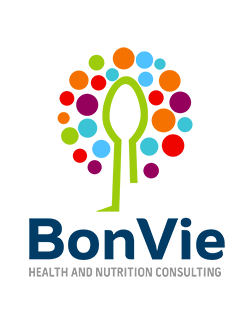 I was lucky enough to grow up in an Italian-American household that was filled with love, great cooks, and lots of delicious and primarily healthy food. From the time that I was a teenager, I was interested in nutrition. My friends used to bring novels to the Jersey Shore for their beach reading, while I read books about nutrition. I was – and still am – slightly obsessed with the Food Network and cookbooks, and I have poured myself into learning about nutrition through the years. Most importantly, I love to eat! I’m what some might call a foodie in the best sense because I’m not afraid to experiment with food and I have a healthy appetite for good food.
I was lucky enough to grow up in an Italian-American household that was filled with love, great cooks, and lots of delicious and primarily healthy food. From the time that I was a teenager, I was interested in nutrition. My friends used to bring novels to the Jersey Shore for their beach reading, while I read books about nutrition. I was – and still am – slightly obsessed with the Food Network and cookbooks, and I have poured myself into learning about nutrition through the years. Most importantly, I love to eat! I’m what some might call a foodie in the best sense because I’m not afraid to experiment with food and I have a healthy appetite for good food.
All this said, I can clearly remember the defining moment in my life when my love of food and nutrition was taken to the next level – I was forever changed. During my junior year of college, I found out that my mother was diagnosed with breast cancer for the second time in her life (I’m happy to say she’s now a two-time survivor). Not only was I terrified about losing my mother, I felt for the first time like a ticking time bomb. After all, my mother was diagnosed twice, her mother had been diagnosed as well, so I thought that my own diagnosis was only a matter of time. I felt scared and helpless. My boyfriend at the time bought me a gift to help me feel better; it was a book called The Breast Cancer Prevention Diet. The book presented lots of research about the relationship between food and cancer, and discussed the many ways that food and exercise can be used to help prevent cancer. Something inside of me clicked. It raised the bar and made even clearer that food could be a pathway to better health instead of something to excessively manage.
Throughout my twenties I really struggled with my desires to have better health, an “ideal” weight, and simultaneously enjoy the yummy foods I grew to love over the years. The book motivated me to try things I’d never done before, like exercising and yoga, and also to eat healthier. However, there was no guide for a woman in her twenties who used food as her emotional crutch to make her feel better. I’ve always struggled with bouts of intense anxiety, and as an Italian-American girl who understood that food is love, I was used to turning to food to make me feel better. As a person who was so well-educated in nutrition, however, I became fixated on “eating well” all the time. I became a compulsive calorie counter and would go back and forth between eating for my health and keeping my weight down, while also bingeing during emotional or anxious times. I had a lot of “food noise” in my head. At any point of the day I could have told you how many calories I had eaten, how many grams of protein, and how much I still needed to have. I still enjoyed food, but I thought about it a lot. And I struggled with the large portions that I grew up eating. I felt that turning down a second portion from my well-meaning but food-pushing father or grandmother would make them feel unloved. It took a combination of therapy, honesty, and hard work to learn to say “no thank you, I’ve had enough,” when they kept pushing to fill my plate again. 
I went on to get a Master’s degree specializing in health communication, and later a PhD in public health with the same specialty. My experiences in graduate school did several things for me: 1) they provided a lot of struggles that challenged my anxieties and helped me to eventually learn healthier coping mechanisms than emotional eating; 2) they provided me with a LOT of teaching experiences and taught me how to reach different kinds of learners in innovative ways; and 3) they provided me with lots of training in research, forcing me to be even more critical about messages in the media related to health and nutrition, and reinforcing the importance of evidence-based research and practice. In other words, I learned how to study and critically evaluate research about health, and use my skills in communications to take sometimes complicated health information and teach it to others in simple ways to help them become motivated, informed, and empowered. Some people have asked me why I never wanted to get a clinical degree as a registered dietitian, but it never appealed to me. I knew that I wasn’t interested in creating meal plans or telling people what they had to eat. Instead, I wanted to be an educator who taught people how to eat in a way that would make them look and feel great, better understand the role of food and nutrition in helping them to do that, and motivate and coach them through the difficulties often associated with these choices. I was born to teach and I believe it’s my calling to serve in that capacity.
After finishing my PhD and moving onto a career in university teaching and individual nutrition coaching, I turned my attention toward having a family. Since I have been struggling with endometriosis for many years, my husband and I were not surprised to have some fertility challenges. However, nothing could have prepared me for my miscarriage in my 11th week of pregnancy. To say that I was devastated would be a huge understatement – I felt destroyed. And after all of the complications and the surgery to help my body recover, I looked in the mirror and saw a pregnant body without a baby.




 I was lucky enough to grow up in an Italian-American household that was filled with love, great cooks, and lots of delicious and primarily healthy food. From the time that I was a teenager, I was interested in nutrition. My friends used to bring novels to the Jersey Shore for their beach reading, while I read books about nutrition. I was – and still am – slightly obsessed with the Food Network and cookbooks, and I have poured myself into learning about nutrition through the years. Most importantly, I love to eat! I’m what some might call a foodie in the best sense because I’m not afraid to experiment with food and I have a healthy appetite for good food.
I was lucky enough to grow up in an Italian-American household that was filled with love, great cooks, and lots of delicious and primarily healthy food. From the time that I was a teenager, I was interested in nutrition. My friends used to bring novels to the Jersey Shore for their beach reading, while I read books about nutrition. I was – and still am – slightly obsessed with the Food Network and cookbooks, and I have poured myself into learning about nutrition through the years. Most importantly, I love to eat! I’m what some might call a foodie in the best sense because I’m not afraid to experiment with food and I have a healthy appetite for good food.

